Recycling, repair, re-use or reducing material consumption through circular business models can provide important additional reductions in greenhouse gas emissions helping to boost Europe’s climate change mitigation efforts, according to a European Environment Agency (EEA) briefing published today.
The new EEA briefing found that while European countries are already undertaking many initiatives on waste management and circular economy, they can do more to account for these actions and their potential emissions savings, when reporting on climate policies and measures. This will provide a fuller account of climate change mitigation efforts and make more transparent the mitigation opportunities that can be delivered by bolstering circular economy actions.
Achieving the European Union’s 2050 net-zero climate target will demand greater actions across all economic sectors. This includes actions related to materials and how we produce, use, re-circulate and dispose of them.
The study looks at how European countries can better include circular economy actions (in general) and waste management actions (more specifically) to speed up reductions of greenhouse gas (GHG) emissions.
Waste management and circular economy hold considerable potential for mitigating climate change. Countries can benefit from linking these two areas as part of their climate policy mix, according to the briefing which is based on two technical reports prepared for the EEA. The studies analyse how European countries include circular economy and waste actions in their official EU reporting on climate change mitigation policies and measures, and how the introduction of such measures can help accelerate future reductions of emissions.
Other key findings
- Circular economy actions are generally underrepresented in the reported national climate policies and measures, often due to their cross-sectoral complexity and the absence of specific guidelines to consider them in climate reporting.
- Some form of circular economy policies and measures are included in 6% of the climate policies reported by European countries (with a strong focus on waste). Impacts on emission reductions that these actions would deliver are however rarely quantified.
- The waste sector’s total GHG emissions in European countries have decreased by 42% since 1990 and are projected to continue declining, with an expected reduction of 68% by 2050 compared to 1990 levels.
- While the waste sector accounts for about 3% of GHG emissions, better use of waste as a resource and preventing waste can help reduce emissions in other sectors.
Information, documents and material available on this website and for which the EEA holds the rights of use are public and may be re-used without prior permission, free of charge, for commercial or non-commercial purposes, provided that the EEA is always acknowledged as the original source of the material and that the original meaning or message of the content is not distorted.







